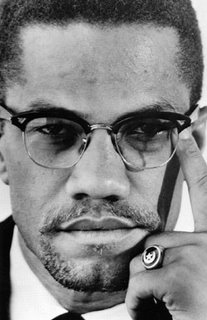Malcolm X

Racial violence played a significant role in the make-up of the man who would be the first great proselytizer for the black-supremacist Nation of Islam movement and provide a more aggressive alternative to the gradualist, nonviolent approach of Martin Luther King, Jr. (whom Malcolm contemptuously referred to as "Reverend Dr. Chickenwing") for the aspirations of African America; but Malcolm X -- born Malcolm Little on this day in 1925 in Omaha, Nebraska -- was a more complex figure in the civil rights movement than the angry, "un-Kingly" street-hustler he is sometimes remembered as, one who ultimately saw the possibilities of black internationalism as a way of working with whites rather than opposing them.
His father was a Baptist minister who recruited for Marcus Garvey’s "Back to Africa" movement; he is thought to have been murdered in 1931 by white hooligans in Lansing, Michigan, as were 3 of Malcolm’s 4 uncles. His light-skinned mother was the product of the rape of Malcolm’s grandmother by a white man. Within 6 years after the death of his father, his mother entered a mental asylum, and Malcolm drifted into a life of juvenile delinquency. As early as 1942, under the name of "Detroit Red," he became involved in drug trafficking and bootleg whiskey in New York City, but soon the police began to catch on to him, so he fled to Boston and joined a burglary ring. In 1946 he was arrested for burglary, convicted and sentenced to 10 years in prison.
While in prison, his brother Reginald encouraged him to study the teachings of Nation of Islam leader Elijah Muhammad. By the time he was released in 1952, he was a convert, and he joined Muhammad as a recruiter, setting up new temples in Boston, Philadelphia and Harlem. Largely through his charismatic work, the sect grew from a few thousand members in 1954 to over 40,000 in 1958.
Malcolm’s activities gained national prominence in 1959 when Mike Wallace hosted a 5-part TV documentary about the Nation of Islam called "The Hate that Hate Produced," which depicted the Nation of Islam (founded by Wallace Fard in 1930) as a sinister sect which advocated white annihilation. While the documentary frightened white America, it touched a chord with black America as the Nation of Islam’s ranks swelled to 100,000.
With the Nation’s membership increasing in the 1960s, African-American leaders were obliged to take Malcolm X seriously, yet Malcolm was publicly antagonistic of the mainstream of the civil rights movement, criticizing its leaders for consorting with white liberals, referring to the NAACP as a "freak . . . with a black body and a white head" and meeting blow-by-blow the optimistic rhetoric of Martin King. "We’re not Americans," Malcolm declared, "we’re Africans who happen to be in America. We were kidnapped and brought here against our will from Africa. We didn’t land on Plymouth rock -- the rock landed on us." His black nationalist posturing was no doubt a formative influence on Bobby Seale and Huey Newton, founders of the militant Black Panther Party.
People within the Nation of Islam movement began to bristle at his popularity, however, charging him with politicizing what had been a purely religious (if admittedly separatist) movement. When Malcolm made the mistake of declaring that the assassination of John F. Kennedy was a case of "the chickens coming home to roost," Muhammad suspended Malcolm from Nation activities.
In the months of reflection and travel which followed, Malcolm began to question some of his own ideas and goals. He made a pilgrimage to Mecca and visited a number of African countries in 1964, was treated as a celebrity by people of different races and engaged in searching dialogues regarding racism. By the time he returned to the U.S., he had converted to orthodox Islam and surprised critics by declaring that he did not believe all whites were evil. In a show of what might have been, he announced the formation of the Organization of Afro-American Unity as a platform for stimulating the interest of African world leaders in assisting black Americans in joining white America in a multicultural, humanist dialogue about rights and opportunities. His more cooperative spirit succeeded in alienating many of his followers. The Nation of Islam, meanwhile, was infuriated with Malcolm for setting up a competing movement and dishonoring Muhammad’s teachings by becoming an orthodox Muslim.
While speaking at the Audubon Ballroom in Harlem on February 21, 1965, Malcolm was shot to death by members of the Nation of Islam; and although Elijah Muhammad denied any prior knowledge of the plot, Malcolm’s widow Betty Shabazz alleged that Muhammad’s successor Louis Farrakhan played a role in Malcolm’s murder until 1995, when she appeared publicly with Farrakhan to denounce the federal government for implicating her daughter Qubilah in a plot to murder Farrakhan. Interestingly enough, Farrakhan later drew upon Malcolm’s pre-OAAU rhetorical legacy in building his own following.
After Malcolm’s death, his celebrated autobiography, co-written by Alex Haley, appeared, and with the release of Spike Lee’s 1992 biopic (starring Denzel Washington), Malcolm’s memory was embraced by a new generation of young African-Americans as black baseball caps and jackets bearing a bold "X" became street fashion staples.
Labels: Civil Rights, Islam





0 Comments:
Post a Comment
Subscribe to Post Comments [Atom]
<< Home